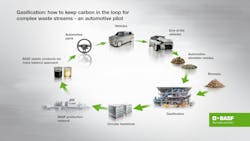BASF, Porsche and BEST Pilot Chemical Recycling for Automotive Plastics
BASF, Porsche AG, and Bioenergy and Sustainable Technologies GmbH (BEST) said they successfully completed a pilot project demonstrating chemical recycling of mixed end-of-life vehicle waste into raw materials for new automotive components.
The project reportedly processed a combination of plastic, film, paint, and foam residues that previously could only be thermally recycled. Using gasification, the waste was converted into synthesis gas, which replaced fossil feedstocks in BASF’s integrated production network for steering wheel polyurethane formulations, the company said.
Robert Kallenberg, head of Sustainability at Porsche AG, said in a statement, “Pilot projects like these allow us to evaluate how we can further develop the circular economy as a sustainability field at Porsche and how we can anchor chemical recycling in our strategy in the long term. We are testing new recycling technologies with our direct partners in order to increase recyclate quotas, gain access to previously unusable recyclate sources and evaluate new processes for waste streams that are currently being thermally utilized.”
The project reportedly marks the first use of a combined waste stream of automotive waste and biomass in a gasification process to produce new plastics. In the announcement, Matthias Kuba, area manager for Syngas Platform Technologies at BEST, said the technology converts mixed plastic waste and biomass into synthetic crude, or syncrude, providing an alternative to incineration and generating high-quality raw materials suitable for safety-critical automotive components.
Martin Jung, president of BASF’s Performance Materials division, said the project reflects BASF’s approach to chemical recycling within its plastics lifecycle strategy, which prioritizes mechanical recycling but incorporates complementary methods such as pyrolysis, depolymerization, and gasification to optimize waste recovery. He added that regulatory support is essential to further develop all recycling technologies in parallel.
Chemical recycling using the mass balance approach reportedly allows the secondary raw materials to be integrated into existing production plants, producing plastics that meet the same quality standards as virgin materials. Sites and products are certified by independent auditors under internationally recognized systems such as ISCC Plus or REDcert².
BASF recently announced its Performance Materials division achieved REDcert² certification at all ten of its European production sites. In May, the company integrated renewable hydrogen into its ammonia production. The resulting grades of renewable ammonia are certified under ISCC Plus.
About the Author
Amanda Joshi
Managing Editor
Amanda Joshi has more than 18 years of experience in business-to-business publishing for both print and digital content. Before joining Chemical Processing, she worked with Manufacturing.net and Electrical Contracting Products. She’s a versatile, award-winning editor with experience in writing and editing technical content, executing marketing strategy, developing new products, attending industry events and developing customer relationships.
Amanda graduated from Northern Illinois University in 2001 with a B.A. in English and has been an English teacher. She lives in the Chicago suburbs with her husband and daughter, and their mini Aussiedoodle, Riley. In her rare spare time, she enjoys reading, tackling DIY projects, and horseback riding.

